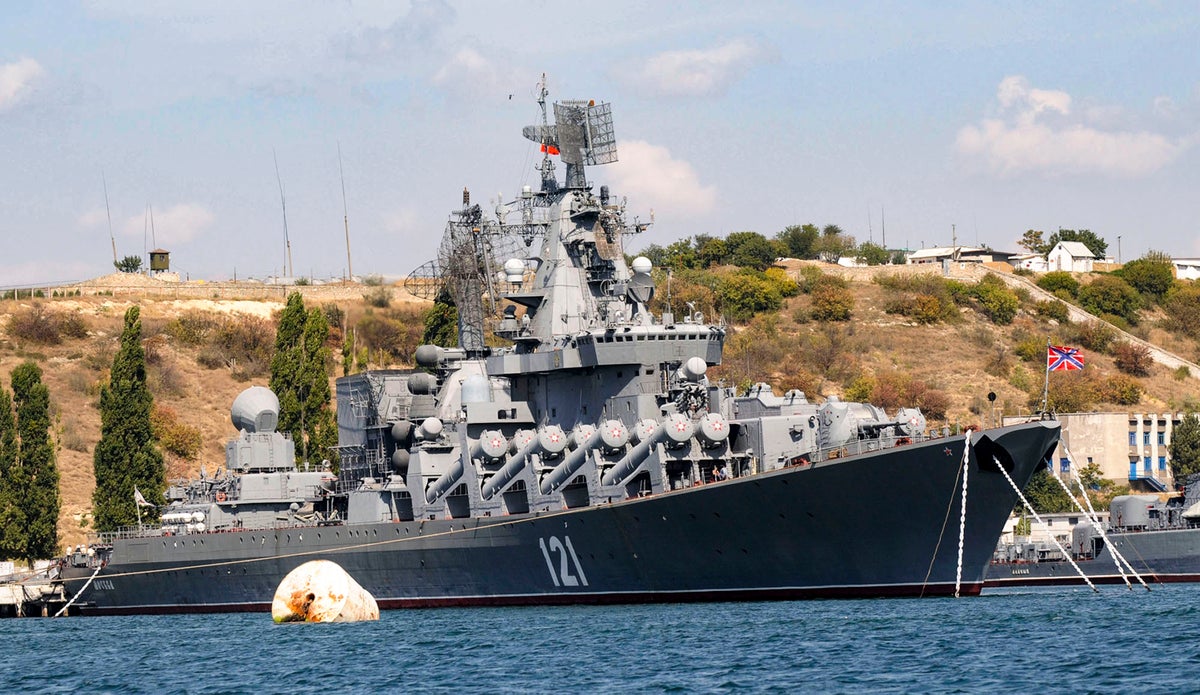
Six people have been injured after a bomb exploded at the headquarters of Russia's Black Sea fleet in the annexed peninsula of Crimea, disrupting the Navy Day holiday.
Russian military officials said an explosive device was taken into the site in Sevastopol by a drone.
Navy chiefs said the aircraft appeared to be homemade and that the explosive device was "low power". Sevastopol mayor Mikhail Razvozhaev said six people were injured in the blast.
It was unclear where the drone began its flight.
Sevastopol is about 100 miles south of the Ukrainian mainland and Russian forces control much of the mainland area along the Black Sea.
Fighting continued elsewhere in Ukraine. The mayor of the major port city of Mykolaiv, Vitaliy Kim, said shelling killed one of Ukraine's richest men, Oleksiy Vadatursky, and his wife.
Mr Vadatursky headed a grain production and export business.
In the Sumy region in Ukraine's north, near the Russian border, shelling killed one person, the regional administration said.
Three people have died in attacks over the past day in the Donetsk region, which is partly under the control of Russian separatist forces, said governor Pavlo Kyrylenko.
Mykhailo Podolyak, an adviser to President Volodymyr Zelensky, said on Sunday that images of a prison where at least 53 Ukrainian prisoners of war (POW) died in an explosion on Friday indicated that the blast came from within the building in Olenivka, which is under Russian control.
Russian officials have claimed the building was attacked by Ukraine with the aim of silencing POWs who might be giving information about Ukrainian military operations.
Satellite photos taken before and after the attack show that a small, squarish building in the middle of the prison complex was demolished, its roof in splinters.
Mr Podolyak said those images and the lack of damage to adjacent structures showed that the building was not attacked from the air or by artillery and contended the evidence was consistent with a hyperbaric bomb set off inside.
Sunday's explosion prompted Mikhail Razvozhayev, the head of the local Russian administration in Sevastopol, to cancel "all celebratory events" due to safety concerns.
Meanwhile, Vladimir Putin, the Russian president, gave a Navy Day speech in St Petersburg and signed a new naval doctrine which cast the United States as Russia's main rival and set out Russia's global maritime ambitions for crucial areas, such as the Arctic and in the Black Sea.
The main threat to Russia, the doctrine says, is "the strategic policy of the USA to dominate the world's oceans" and the movement of the NATO military alliance closer to Russia's borders.
Russia may use its military force appropriately to the situation in the world's oceans should other soft powers, such as diplomatic and economic tools, be exhausted, the doctrine says.
Putin did not mention the conflict in Ukraine during his speech but the military doctrine envisages a "comprehensive strengthening of Russia's geopolitical position" in the Black and Azov seas.
It also set out the Arctic Ocean, which the United States has repeatedly said Russia is trying to militarise, as an area of particular importance for Russia.
Russia's vast 37,650 km (23,400 mile) coastline, which stretches from the Sea of Japan to the White Sea, also includes the Black Sea and the Caspian Sea.
Putin said the delivery of Zircon hypersonic cruise missiles to the Admiral Gorshkov frigate would begin within months. The location of their deployment would depend on Russian interests, he said.
"The key thing here is the capability of the Russian navy... It is able to respond with lightning speed to all who decides to infringe on our sovereignty and freedom."
Hypersonic weapons can travel at nine times the speed of sound, and Russia has conducted previous test launches of the Zircon from warships and submarines over the past year.







